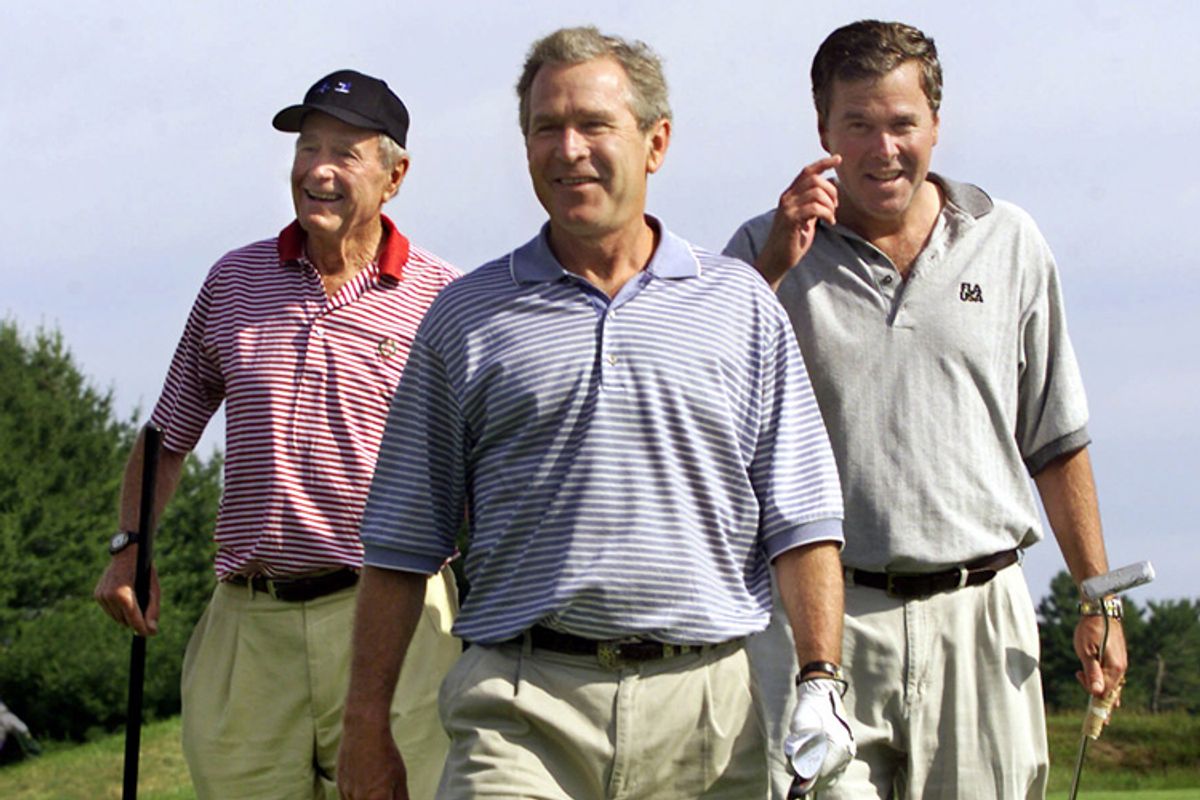When it comes to politics, Americans sure seem to like familiar faces and names. There have been 15 presidential elections since 1952, and in all but two -- 1964 and 2008 -- the Republican ticket has included someone named "Nixon," "Dole," or "Bush." And while there's been a little more variety on the Democratic side, it may be mainly the result of tragedy: How many more national tickets would have featured a Kennedy if not for two assassinations and Chappaquiddick?
For a brief moment in the 2008 campaign, it seemed we might be on the verge of something of a post-dynastic era, with Democrats spurning Hillary Clinton in favor of a first-term senator who had been in the Illinois state Legislature just four years earlier, and with the Bush family name in disrepute thanks to George W.'s misadventures. But that was probably an illusion, something we were reminded of earlier this week, when Jeb Bush dropped yet another hint that he sees a White House run in his future.
"If I ran for office, I would be a proud younger brother of George W. Bush and a proud son of George H.W. Bush," the former Florida governor said in Nevada on Monday. As he has done before, Bush ruled out running for president next year, but left the door wide open for 2016.
He probably can afford to wait. As I've written before, despite the sour economy, the 2012 GOP nomination may not look that appealing to ambitious Republicans, especially with the example of Bill Clinton's post-1994 comeback still relatively fresh in their minds. So from Bush's standpoint, why not take a chance that the nomination will be open in '16, when he'll be 63 -- and when the taint from his brother will be less pronounced (if there's even any taint left)?
What's interesting about Bush's recent rumblings is how little his brother's disastrous presidency seems to be a factor in news coverage and commentary. When his name has been included in '12 trial heats, Bush has fared well against the GOP field. Memories of W.'s 30 percent approval ratings and the gruesome 2006 and 2008 elections are not causing Republicans to instinctively cry "Never again!" at the mention of yet another Bush candidacy. Why is this? Part of the reason is that W., even at his lowest moments, was never that unpopular with the GOP base -- it was Democrats and independents who reviled him. But it also has something to do with how quickly and easily the political world moves on. In early 2009, the economy was terrible and Bush was still in the White House; in early 2011, the economy is terrible and Bush is long gone, replaced by a Democratic successor (who enjoyed, until recently, overwhelming Democratic congressional majorities). The frustration and disappointment many independents had felt toward Bush has been redirected toward Obama, replaced (for some) by something approaching nostalgia. Thus, W.'s poll numbers are up significantly -- and the Republican base that stuck with W. feels a measure of vindication.
This is the same basic phenomenon that allowed W. to claim the presidency in 2000, just eight years after his father was drummed out of office with the lowest share of the popular vote for any incumbent president since William Howard Taft. George H.W. Bush was branded a sellout by many conservatives and an all-around failure by independents, but after two years of Bill Clinton, his popularity was back up with both groups -- just in time for the 1994 midterms, in which W. unseated his father's old tormentor, Texas Gov. Ann Richards. As 2000 approached, W. received all of the benefits of his family name -- money, media attention and front-runner status in early polling -- with essentially no taint. 2016 is a long way off (and who knows -- maybe the GOP nominee actually will knock off Obama next year), but it's not impossible to see something similar playing out with Jeb. At the very least, this possibility seems to be on his mind now.
In 2016, it will have been 66 years since Jeb's grandfather, a Wall Street banker and son of privilege named Prescott Bush, first ran for office in Connecticut. Prescott Bush ended up serving in the Senate for 10 years, and four years after he left office, his son George H.W. Bush was elected to a U.S. House seat from Texas -- the start of an ascent that would lead him to the vice presidency in 1980 and the presidency in 1988, ultimately greasing the skids for W. and Jeb (not to mention a brief, abortive 1982 Senate candidacy by H.W.'s brother, Prescott Bush Jr.). And on and on it goes.
Not, as I noted, that Democrats aren't in the dynasty business themselves. After all, if Jeb Bush does end up running as the Republican nominee in 2016, the early money says his Democratic opponent will be ... Hillary Clinton.



Shares